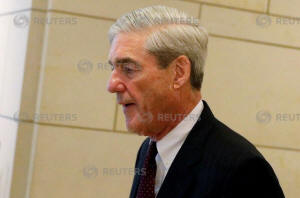|
U.S. court case tests Special Counsel
Mueller's power, status
 Send a link to a friend
Send a link to a friend
 [November 09, 2018]
By Sarah N. Lynch [November 09, 2018]
By Sarah N. Lynch
WASHINGTON (Reuters) - A U.S. Justice
Department attorney on Thursday spelled out the circumstances under
which Special Counsel Robert Mueller could be fired in a court case that
took on new significance this week after President Donald Trump ousted
his attorney general.
The case, argued on Mueller's behalf by Deputy Solicitor General Michael
Dreeben who is working temporarily on assignment in Mueller's office,
started months ago as a challenge to the legality of Mueller's
appointment and his authority.
When Trump ousted Attorney General Jeff Sessions on Wednesday and
replaced him with Matthew Whitaker, Democrats in the U.S. Congress
immediately warned that Trump might be moving to dismiss Mueller and
squash his probe.
The 18-month-old Mueller probe into Russian meddling in the 2016 U.S.
presidential election and possible collusion between Moscow and the
Trump campaign has clouded the Trump presidency.
Russia denies it meddled in the election. Trump, who frequently blasts
the Mueller probe as a "witch hunt," denies any campaign collusion with
the Russians.

In May, Andrew Miller, who is an associate of long-time Trump adviser
Roger Stone, refused to comply with a grand jury subpoena from Mueller.
Miller was held in civil contempt. He filed a legal challenge, asserting
Mueller has no authority to compel his testimony or to oversee the probe
because he was illegally appointed.
Dreeben told a three-judge appeals panel on Thursday that there are
checks and balances on Mueller's activities that make his appointment
lawful. One of these is that he could be fired by Whitaker, now acting
attorney general, if Whitaker revoked department regulations governing
Mueller's appointment to make him fireable without cause.
[to top of second column]
|

Special Counsel Robert Mueller departs after briefing the U.S. House
Intelligence Committee on his investigation of potential collusion
between Russia and the Trump campaign on Capitol Hill in Washington,
U.S., June 20, 2017. REUTERS/Aaron P. Bernstein -/File Photo

The special counsel is not "off in a free-floating environment,"
Dreeben said in arguments before the U.S. Court of Appeals for the
District of Columbia Circuit that attempted to show Mueller's power
is circumscribed by the law.
Central to the case is whether Mueller is an inferior or a principal
officer under the Appointments Clause of the U.S. Constitution.
Dreeben argued Mueller is an inferior officer and subject to the
direction and supervision of presidentially appointed officials.
Miller's attorney Paul Kamenar argued Mueller is a principal officer
and cannot be fired except for good cause.
Mueller was named special counsel by Deputy Attorney General Rod
Rosenstein after Sessions recused himself from the probe. Rosenstein
lost his role as Mueller's supervisor to Whitaker on Wednesday when
Sessions was forced out by Trump.
Whitaker has been critical of Mueller's probe in the past and
Democrats in Congress have called on him to recuse himself.
A Justice Department spokeswoman has declined to comment on whether
he may recuse himself. Whitaker has not yet discussed how he may
handle the Mueller investigation.
The three-judge panel did not indicate when it may rule in the case.
(Reporting by Sarah N. Lynch; editing by Kevin Drawbaugh and Cynthia
Osterman)
[© 2018 Thomson Reuters. All rights
reserved.]
Copyright 2018 Reuters. All rights reserved. This material may not be published,
broadcast, rewritten or redistributed.
Thompson Reuters is solely responsible for this content. |